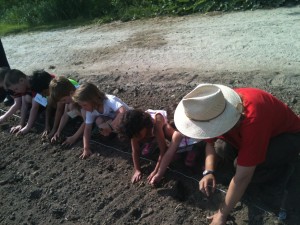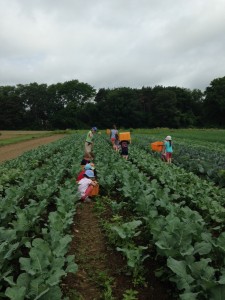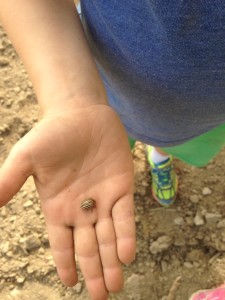Post by Drumlin Farm Food and Farm Educator Emma Scudder
If you’ve ever ventured down to Boyce Field, home of Drumlin’s crops operation, then you know the beauty of the place. As far as the eye can see are rows and rows of vegetable plants. (Maybe I’m biased as a farm educator, but to me there is no better sight!) However, beyond affording a beautiful view, Boyce Field serves the equally important but lesser known role of classroom for our many visitors, students, and campers.
As an outdoor learning space, Boyce Field is a dynamic place where our school program participants experience hands-on learning that’s connected to classroom curriculum and science standards. When schools sign up for field trips, teachers often give us information about the concepts they are studying, where they are in their unit, and the main curriculum connections they hope to make. With this information, we’re able to assign students a chore that’s not only tied to classroom learning but is also meaningful work.
participants experience hands-on learning that’s connected to classroom curriculum and science standards. When schools sign up for field trips, teachers often give us information about the concepts they are studying, where they are in their unit, and the main curriculum connections they hope to make. With this information, we’re able to assign students a chore that’s not only tied to classroom learning but is also meaningful work.
 This past May, students learned about plant lifecycles while helping to de-bud first-year strawberry plants. (In order to encourage healthy growth in newly panted strawberries, we don’t harvest fruit; instead we remove their blossoms so they will not produce fruit.) Before we began, we reviewed the phases of the plant life cycle and how pulling flowers off of the young plants allows them invest their energy into growing strong roots and leaves, so that next year we can harvest delicious fruit from healthy, hearty crops. Students were able to observe strawberry plants that were in their second season, which were noticeably fuller and heavy with strawberries, and make the connection that the work they did will have a long-term positive impact on the plants and our farm.
This past May, students learned about plant lifecycles while helping to de-bud first-year strawberry plants. (In order to encourage healthy growth in newly panted strawberries, we don’t harvest fruit; instead we remove their blossoms so they will not produce fruit.) Before we began, we reviewed the phases of the plant life cycle and how pulling flowers off of the young plants allows them invest their energy into growing strong roots and leaves, so that next year we can harvest delicious fruit from healthy, hearty crops. Students were able to observe strawberry plants that were in their second season, which were noticeably fuller and heavy with strawberries, and make the connection that the work they did will have a long-term positive impact on the plants and our farm.
Of course the learning doesn’t stop at the end of the school year: In the summer, campers have  the opportunity to delve into the crops operation at the busiest and most exciting time of the season. Recently, one group of campers, whose session focused on sustainable farming, spent an afternoon learning about and practicing sustainable pest control, picking Colorado potato beetles off of potato plants. As we went, campers were asked to think about how the practices we use at Drumlin are different from some other farms, where chemical pesticides are sprayed, and the environmental impacts of both methods. The afternoon flew by as campers explored issues related to our food system.
the opportunity to delve into the crops operation at the busiest and most exciting time of the season. Recently, one group of campers, whose session focused on sustainable farming, spent an afternoon learning about and practicing sustainable pest control, picking Colorado potato beetles off of potato plants. As we went, campers were asked to think about how the practices we use at Drumlin are different from some other farms, where chemical pesticides are sprayed, and the environmental impacts of both methods. The afternoon flew by as campers explored issues related to our food system.
An added bonus: All this learning happens to be a big help to our crops operation! So far this season, program participants have contributed 65 hours of meaningful work, all while engaging in scientific learning in ways they never could have in an indoor classroom.

